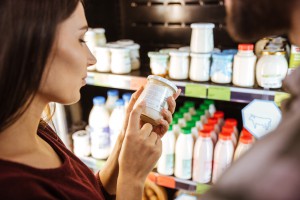You have a project?
Ask questions about Lascom products to our team of experts; we will be glad to answer you as soon as possible. Express your needs and expectations; we will do our best to organize a meeting with our sales team.
The Consumer Goods Forum (CGF) – a network of 400 members across 70 countries – has urged food companies to simplify food date labels by 2020 in an effort to reduce consumers’ confusion related to “used/sell by” dates, and to prevent food waste. CGF has, among its members, some of the biggest manufacturers and retailers in the world, such as Tesco, Walmart, Target, Campbell Soup and Unilever.
The Call to Action to simplify date labels was unanimously adopted, mid-2017, by the CGF Board of Director, and addresses two important challenges faced by the food industry:
1) Once used to reinforce food safety, consumers now deal with a range of date labels on food products, from “Sell by”, “Use by”, “Display until”, to “Best before”, and so on, which leads to consumers’ confusion about their real meanings.
In the United States, the US Department of Agriculture’s (USDA) Food Safety and Inspection Service (FSIS) is responsible for developing regulations for food labeling, however there is no specific regulation - except for the product label of infant formula - regarding what date-labeling phrases to use. As stated by the FSIS, “There are no uniform or universally accepted descriptions used on food labels for open dating in the United States. As a result, there are a wide variety of phrases used on labels to describe quality dates.” This lack of enforced regulations might have encouraged the CGF to take actions to standardize date labels across the globe.
2) Food waste is the second main reason for these new guidelines. Indeed, an estimated 1.3 billion tons of food worldwide is wasted each year. In the US, this confusion over date labels on food products costs families up to $29 billion annually. The average American family spends about $1,500 per year on food that is thrown away.
The food date labels play a key role in this food waste as consumers might toss out food when they pass their “sell by” dates, even though the food is still safe to eat. According to Maria Fernanda Mejia, Kellogg’s senior vice president, “Simplifying food date labels is an important step forward in preventing food waste, and will help end the confusion related to ‘sell by’ dates.” Moreover, Peter Freedman, Managing Director of the CGF, said that having simplified and consistent date labels will support companies in reducing food waste by half by 2025.
The CGF has come up with new guidelines, particularly three important steps to simplify those labels and reduce food waste by 2020:
As seen, in the US, there is a no precise government safety regulations regarding expiration dates – except for infant formula –, so organizations, such as the Consumer Goods Forum, which brings together CEOs from the consumer goods industry, encourage global adoption of practices and standards to improve the industry worldwide. As a result, more and more companies take initiatives to standardize their date labels with a view to increasing consumer understanding and reducing food waste.
“[…] it’s so important we extend this practice to more companies in every country. Streamlining date labels worldwide by 2020 could be game-changing in the fight against global food waste” – Dave Lexis, Tesco Group Chief Executive.
Learn how Lascom's PLM software can help you manage your product labeling and comply with regulations!
